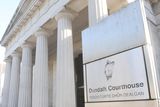Paddy Donegan 1923-2000
ODalaigh affair blighted a brilliant political career Unlike the majority of aspiring politicians in Ireland, Paddy Donegan started life in politics at the very top.
It was in 1954 that the dynamic young farmer and businessman from Monasterboice squeezed out Fianna Fail incumbent, Larry Walsh in the general election of that year.
The following year Deputy Donegan made his first real entry into politics at local level when he was elected to Louth County Council after his father, the late Tommy Donegan, stood down.
Two years later however he suffered his first and only general election defeat, despite a respectable first preference vote of 5,885.
But by 1961 he was back on the national stage when he was again returned as the Fine Gael candidate in the general election of that year and was the party’s standard bearer winning every contest until in December, 1980 he dramatically declared that he would not be a candidate in the next general election in 1981.
It was not until 1973, almost twenty years since first entering the Dail, that Paddy Donegan achieved one of his lifetime ambitions in politics when the Fine Gael-Labour Coalition took office under the leadership of Taoiseach, Liam Cosgrove.
Cosgrove appointed Paddy Donegan to Defence at a particularly dangerous and sensitive time when the Northern troubles were reaching their height and there was a high level of sympathy in the Republic for the activities of the IRA who were seen as a bulwark against the prejudices and discrimination which the nationalist population was experiencing in the North.
His political career was irrevocably defined by a comment he made while Minister for Defence in 1976. His words led to the resignation of President Cearbhall O’Dalaigh and to Mr. Donegan’s subsequent demotion in a Cabinet reshuffle.
The context of the controversial comments was the President’s decision to refer the Emergency Powers Bill to the Supreme Court some weeks earlier. The court ruled that the Bill did not infringe the Constitution and the measure became law shortly before Mr. Donegan opened an Army canteen in Mullingar.
Speaking during the lunch the Minister departed from his script and said it was “amazing” that the President referred the Bill to the Supreme Court adding “in my opinion he is a thundering disgrace”.
Mr. Donegan subsequently apologised but ignored calls to resign. A Dail motion calling for his dismissal was defeated, and the affair ended when President O’Dalaigh resigned, citing the need to defend his office.
His party leader and friend, Liam Cosgrove resisted calls to fire Mr. Donegan from the Cabinet after the President resigned, but in the Cabinet reshuffle Mr. Donegan was moved to Lands and Fisheries, a post that never challenged his ambitions or his desire to be at the centre of political thinking in the country.
Many felt that his spirit was broken by the affair and he claimed in interviews afterwards that he had been suffering from concussion when he made his remarks in Mullingar having been involved in an accident the night previously. He also claimed that he was motivated by the belief that the IRA had exploited the delay in the legislation introduction and that the delay had caused loss of life.
For six years prior to becoming Minister for Defence, Mr. Donegan acted as Chairman of Louth County Council, a role he undertook with much zest and ability and during the same years he also served as a member of the North Eastern Health Board at a time when the Board was in its formative years.
He also served as a member of Louth Committee of Agriculture, and Drogheda Harbour Board.
He continued to serve on the local authority after his decision to stand down from the Dail, and was succeeded by his son, Tommy on Louth County Council.
‘It was a difficult job being Cabinet Minister’
Paddy Donegan’s decision to quit national politics came as a shock to his party.
At the age of 57, a comparatively young age for politicians of his generation, the former Minister announced his decision in December, 1980.
He told his party that he wanted to devote more time to his family and business interests.
“I don’t suppose that I have been fair to either and the time has come to make a choice” he said.
But he stressed that he was not getting out of politics because of differences with Fine Gael and the new party leader, Dr. FitzGerald.
“I have no row with Fine Gael, I made my decision now because it will afford the party time to select a new candidate” he aid.
He said he wanted to continue to stay in local politics until the next local elections at least, having only been re-elected the previous year.
Mr. Donegan admitted that it would be an unusual election in Louth in 1981 without Padraig Faulkner who, as Ceann Comhairle did not have to seek re-election, or himself on the ballot paper by saying “since we have consistently topped the poll for the last 20 years it will mark the end of a political era in Louth”.
Significently he said on his resignation that he was unsure if he would do it all again.
“Right now I feel that I wouldn’t’ he said “but given the same circumstances under which I started and knowing the fool that I am, I suppose that I would”.
He wouldn’t go as far as to say that getting a seat in Cabinet fulfilled his political ambition for he said “certainly it was the highlight of my career, for it gave me the opportunity to do some things that I wanted to do in opposition.
He added “Being a Minister was difficult, but it was a rewarding task at times and I would have to say that it was a great challenge”.
Emotional night when he stood down at the 1981 convention
Paddy Donegan had looked back with pride on his career as Minister for Defence when he bowed out of politics in Louth at the 1981 Fine Gael convention.
In an emotional address at the party convention, the former Minister for Defence, Land and Fisheries looked back at a career of over a quarter a century of service to politics.
Making it clear that he had no axe to grind he said “I leave Fine Gael with no cribs, either with the party or the leadership, only loyal thanks to the people of Louth who had supported me for so long.”
He said he was retiring from politics due to family and business committments.
The people of Louth had, he said, supported him “right loyally” and he thanked them for all the opportunities they gave him, especially as a Minister.
He recalled that when the Coalition took office, the departments of Defence and Justice were in a shambles and had they not grasped the nettle there could have been a serious situtation.
And he admitted that the stance adopted by people like himself, Paddy Cooney and Conor Cruise O’Brien, quite probably lost votes but in those Golden Years not one member of the cabinet believed the bomb and the bullet was the way to unite Ireland.
He spoke of increasing the army’s strenght from 8,000 to 14,000 and how the men of violence were put down.
“We laid the ground work, and not that Fianna Fail have done so well after us for every bank in the country seems to have been robbed since they took office.”
He said he would continue to work for Fine Gael and hoped the new T.D.s would get the support he had received, adding “from the bottom of my heart, thank you”.
The convention chairman, Deputy John Boland (who himself died this year), paid tribute to Deputy Donegan’s generousity, big heart, warmth, and abiding loyality to the party and the nation.
Deputy Donegan had been respected, admired and loved by those who worked in the areas in which he had served as Minister of Defence and Fisheries.
One practical example of his achievements was the launching of the Navy sail trainer, the Asgard 11, in the previous few weeks, which would not be there only for him. The people of Louth could be proud of Paddy Donegan, he concluded.











